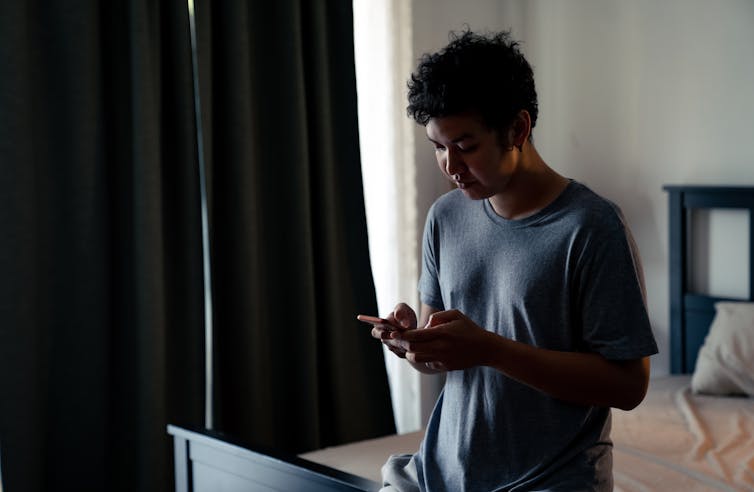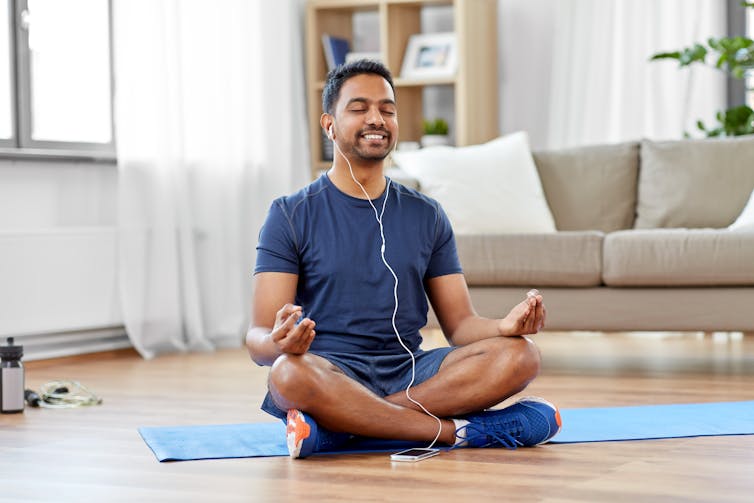5 ways to get mental health help without having to talk on the phone
- Written by Aliza Werner-Seidler, Senior Research Fellow in Mental Health & Clinical Psychologist, UNSW
Access to mental health support has never been more important, as Melburnians are hit with a stage 4 lockdown and much of the rest of Australia braces for a potential second wave of COVID-19.
This year, many mental health professionals have moved to providing telehealth services via phone and video calls.
But what options are available for those who don’t like talking on the phone, or who find it difficult to find a quiet space to have a private conversation?
Fortunately, there are several ways to get help without having to speak a word.
Read more: State of disaster called as Melbourne moves to nightly curfew and stage 4 restrictions
1. Talk with a therapist via SMS or web chat
You can access free web chat or text messaging services that allow you to talk with a therapist via messaging.
Lifeline launched an online chat service in 2011, and in 2018 it set up an SMS text service that is available between 6pm and midnight (AEST). These services provide short-term support if you’re in a crisis, with research showing reduced distress and increased coping and connectedness among users of the service.
The Beyond Blue online chat service is another option, established in 2013 and available daily between 3pm and midnight. This is a general service that offers short-term counselling with a trained counsellor, but does not provide crisis support. A recent study found those who received help from Beyond Blue experienced lower levels of distress (although the study evaluated the services as a whole, rather than separating out those who received help over the phone versus via web chat).
Similar web chat services are available for children, teens and young adults via the Kids Helpline.
 For some of us, hearing our phone ring is a daunting experience. Thankfully, there are many ways to talk to a therapist via text.
Shutterstock
For some of us, hearing our phone ring is a daunting experience. Thankfully, there are many ways to talk to a therapist via text.
Shutterstock
2. Online clinics or programs
Online clinics provide a range of self-guided mental health treatment programs. This means you work your way through the program at your own pace, without input from a mental health professional. These programs tend to have a variety of modules that provide information about common mental health symptoms, and include some suggested strategies about how best to manage these symptoms.
MindSpot is Australia’s first free national online clinic that offers psychological assessment and treatment for people experiencing common mental health problems such as anxiety, stress and depression. After completing an online assessment, you are directed to the appropriate online program, and can connect with a MindSpot therapist if you wish.
Mindspot programs include up to five lessons that can be completed over about eight weeks. Each lesson takes a few hours, and the general structure is to read through the lesson information and then practise the skills in your daily life. Throughout the program there are also real-life examples of people who have managed to overcome their symptoms, and there is an option for a weekly check-in with a therapist (although that would be over the phone). There have been more than 100 research studies relating to MindSpot, showing these treatment programs are effective in helping to reduce common mental health issues.
This Way Up programs are a suite of short online courses that cover a range of mental health concerns. You can select the course you’d like to do, and then work through a series of lessons and activities. For example, if you are struggling with low mood and worry, there is a mixed depression and anxiety course that provides material to develop skills in managing these symptoms. There are also options for you to select the approach that most appeals to you, including mindfulness-based or cognitive behavioural therapy (CBT) approaches (CBT uses strategies to help change unhelpful thoughts and behaviours). These courses cost A$59 each and access is available for three months. If you already have a psychologist, they can supervise your progress through the program.
These programs have been evaluated in many randomised controlled trials, with findings consistently showing they can be as effective as face-to-face therapy.
3. Peer support forums
Online peer support forums provide a safe online space where you can anonymously share your personal experiences and questions, and get support from others on the forum who may have helpful advice and suggestions based on their own experiences. These forums are usually moderated by professionals or trained volunteers and are places to get support rather than counselling, mental health treatment or crisis management.
Some popular mental health forums include those moderated by SANE, BeyondBlue, and headspace (for people aged 12-25). While evidence suggests peer support forums don’t necessarily reduce anxiety or depression, they are not harmful and may help to normalise emotional experiences and help users feel connected to others.
4. Smartphone apps
There are many mental health smartphone apps available to download.
Many of these apps have not been scientifically tested to verify their health claims, although some apps that are supported by evidence include the Headspace app and Smiling Mind, both of which have a mindfulness focus. Mindfulness uses meditation to develop awareness and acceptance to reduce the impact of negative thoughts and feelings. Evidence suggests mindfulness meditation programs have beneficial effects on mental health.
 Many smartphone apps offer guided meditation and mindfulness, which can help you focus on the present and improve your mental health.
Shutterstock
Many smartphone apps offer guided meditation and mindfulness, which can help you focus on the present and improve your mental health.
Shutterstock
5. Chat bots
A chat bot is a program designed to simulate conversation with you, often using artificial intelligence. What this means is that you type in your thoughts, feelings and questions and an AI bot will respond to you.
There are several chat bots designed to provide mental health support. The most widely used ones are Woebot and Wysa (for children and teens). Both use artificial intelligence to deliver information based on cognitive behavioural principles, which can help you change your patterns of thinking or behaviour.
They aren’t designed to replace other forms of mental health support, but rather to complement them. But there is emerging evidence that chat bots can benefit mental health.
Read more: As 'lockdown fatigue' sets in, the toll on mental health will require an urgent response
Research published in July showed three-quarters of Australians are reporting worse mental health since the pandemic began, with feelings of loneliness, stress and worry being most common.
At a time when face-to-face consultations are impossible for many Australians, and if telehealth is just not your style, there are a host of other options worth considering — and many of them are free.
This article is supported by the Judith Neilson Institute for Journalism and Ideas.
Authors: Aliza Werner-Seidler, Senior Research Fellow in Mental Health & Clinical Psychologist, UNSW




